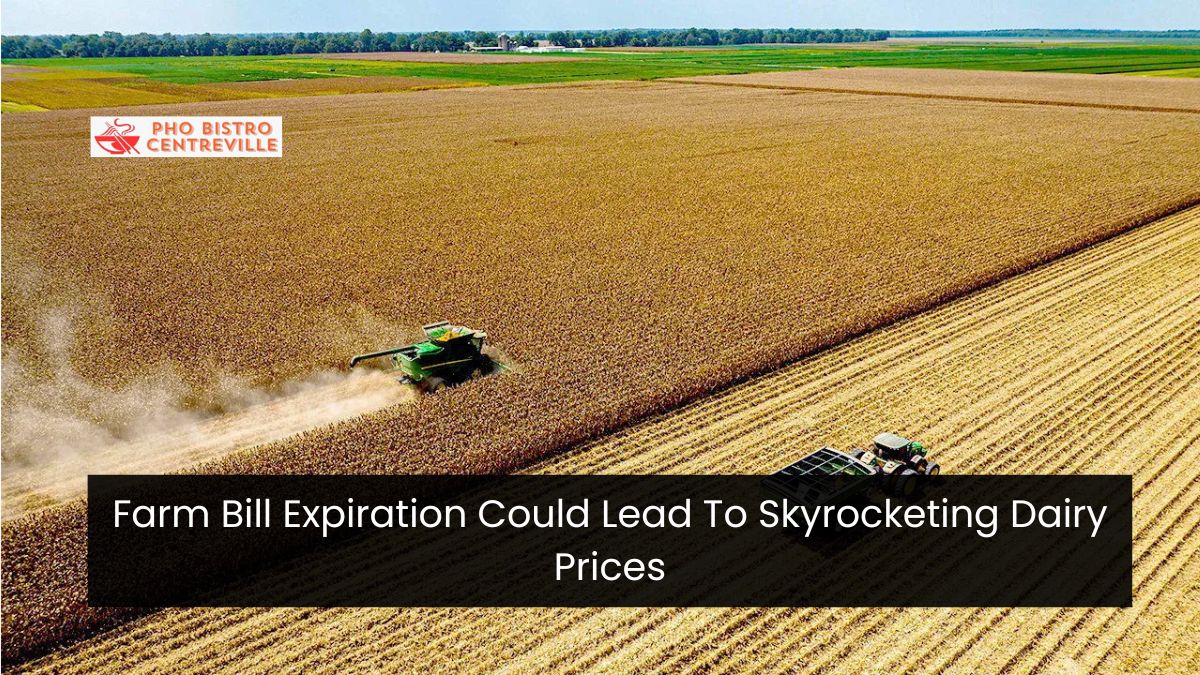The U.S. Farm Bill will end on September 30, 2023, which means that many programs for farmers, the environment, and nutrition will lose funding.
This will affect things like crop insurance, disaster relief, and food assistance programs such as SNAP.The $1.5 trillion law affects farmers, shoppers, and others.
If it ends, it could create issues in the farming markets. Without a new law soon, some programs may return to old methods. This is worrying for the dairy industry, as prices could increase due to the “Dairy Cliff.”
The Farm Bill: What Is It and Why Is It Important?
One of the most essential laws for American farming, food, land, & rural areas is the Farm Bill. It was first made in the 1930s. Congress usually makes the Farm Bill a law every five years. This helps farmers get help when needed, like when there are disasters, or to get insurance for their crops.
The Farm Bill is a massive piece of legislation that affects millions of Americans. Its scope has expanded over time to include nutrition and conservation programs in addition to agriculture.
Due to the bill’s broad scope, a wide range of interests are brought together, including players in rural development and conservation, national agricultural groups, and nutrition advocates.
However, many important programs may lose funding or go back to old ways if they don’t get renewed by September.
Farmers’ Immediate Effects of the Expiration
The most significant immediate effect of the bill’s expiry on the agricultural community is uncertainty, especially regarding disaster relief and subsidy programs.
Some parts of the farm bill, such as crop insurance, will always be safe. But other parts, like support for dairy farmers, might end unless a new deal is made. This could lead to issues like the “Dairy Cliff” if the DMC program ends.
The DMC program aims to safeguard dairy producers by providing payments when the difference between milk prices and feed costs narrows too much.
Without this initiative, farmers may face a decline in their profit margins, which might result in higher dairy costs for consumers by 2025. Given the present high expenses in agriculture owing to variables like inflation and weather-related crop failures, this development is particularly alarming.
Where the Pinch Will Feel for Customers
Other industries are also at risk, but the dairy industry will be most obviously impacted. The possibility of higher food prices is a major worry for consumers.
Costs for dairy products could rise, but if farmers cut back on output because there aren’t any clear subsidies or support systems in place, then costs for other necessities would follow.
According to Modern Farmer, many USDA programs are at risk because the measure has expired. These programs help organic farmers, food banks, and agricultural research. They are important for making sure that people can buy good quality food at affordable prices and for supporting farmers.
Land conservation initiatives are also affected by the expiry of the Farm Bill. Groups such as the Theodore Roosevelt Conservation
Partnership have cautioned that attempts to enhance public access to lands and conserve habitat may suffer if initiatives such as the Conservation Reserve Program are not renewed.
Effects on Nutrition Programs and SNAP
More than 40 million low-income Americans benefit from the SNAP program, which is funded independently but is nevertheless a part of the larger Farm Bill package.
Republicans’ planned cuts to SNAP, which Democrats have fiercely opposed, have been one of the primary causes of the congressional impasse. Republicans have been pressuring Congress to impose stricter qualifying requirements & reduce funding, but Democrats have resisted, arguing that dietary aid is crucial, especially in challenging economic times.
The political impasse has delayed the passage of the Farm Bill. In the meantime, families that depend on SNAP assistance are forced to worry about their future access to food.
According to a recent story by The Michigan Advance, the Farm Bill process this year has been more politicized than average. Sen. Debbie Stabenow (D-Michigan) expressed her anger about the impasse, particularly food aid programs.
What Happens to the Farm Bill Next?
Congress must approve a new Farm Bill by 2024 to avoid driving the agricultural sector & related programs over a precipice. A short-term continuing resolution could be proposed to prevent a catastrophe and temporarily continue important initiatives, particularly in the dairy industry.
High stakes are involved. More than 300 farm organizations banded together earlier in September to urge Congress to act quickly.
They stated that “failing to reauthorize a Farm Bill without meaningful investments in commodity programs and crop insurance would leave thousands of family farms with no options to continue producing for this nation in 2025 and beyond.”
The expiry of the Farm Bill is a critical juncture for the American economy, consumers, and farmers. If a new Farm Bill isn’t passed quickly, the already high cost of food will rise, further straining low-income families’ finances and making conservation efforts more difficult.
The future of farming in America and the prices you pay at the store are uncertain while Congress talks. With upcoming elections, the Farm Bill may face more political problems. But it’s still important to renew the law soon. Farmers and shoppers could be greatly affected if a new law or extension isn’t approved.
Conclusion:
The end of the Farm Bill is causing issues. By 2025, prices for milk and cheese could increase a lot, and people with low incomes might struggle to buy food. Congress needs to find a solution quickly to keep American farming strong and ensure food is affordable and accessible.

